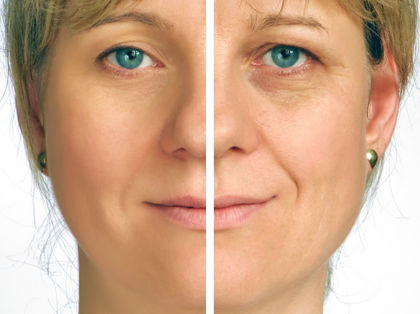The Integumentary System - Taking care: keeping the integumentary system healthy

As people age, dramatic changes take place in the integumentary system. The epidermis thins as basal cells divide less and less. The dermis also thins and its elastic fibers decrease in size. As a result, the skin becomes weaker and starts to sag, forming wrinkles. Melanocytes decrease production of melanin, and the skin becomes pale and hair turns white. Sebaceous glands also decrease production of sebum, causing the skin to become dry and scaly. Blood supply to the skin is reduced and body temperature cannot be regulated as well. Finally, the skin takes longer and longer to repair itself.
Although there is no way to avoid aging of the skin, there are ways to decrease the effects of aging. The loss of elasticity in the skin is speeded up by sunlight. The skin should be shielded from the Sun through the use of sunscreens, sunblocks, and protective clothing. Sunburns are never healthy and should always be avoided. This will also help reduce the risk of skin cancer.
As in all other body systems, the following play a part in keeping the integumentary system operating at peak efficiency: proper nutrition, healthy amounts of good-quality drinking water, adequate rest, regular exercise, and stress reduction. Hair loss and graying are both genetically controlled, but stress can add to both conditions. Exercise and relaxation techniques are proven ways to reduce stress.
Proper daily cleansing of the skin is highly recommended. However, harsh detergents and scrubbing will not make the skin cleaner. In fact, they can injure the skin and cause excessive drying. Greater benefits can be gained by cleaning the skin with gentle soaps or lotions, then applying an appropriate moisturizer to all areas of the body.

Comment about this article, ask questions, or add new information about this topic: